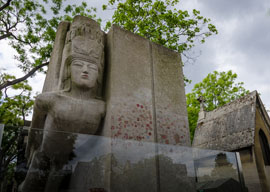
April 02, 2016

Tomb of Oscar Wilde, Père-Lachaise
Source: Bigstock
Whenever I am in Paris I stay near Père-Lachaise, the greatest cemetery in the world, and I always take at least one walk in it. It is, like life and literature, inexhaustible; and after all, the paths not only of glory but of journalism, too, lead but to the grave.
On the way there this time I was passed by a road-sweeping vehicle with an excellent advertisement on its side. It showed a vast pyramid of cigarette ends, with the legend “350 tons of cigarette ends per year”: the sum of such annual sweepings in Paris. This must equate to an awful lot of death.
On the matter of smoking I suffer not so much from cognitive as from emotional dissonance. On the one hand I detest the filthy habit, and whenever I see the slogan SMOKING KILLS on a discarded packet on the ground, I think, “Yes, but not quickly enough.”
On the other hand, I detest the antismokers, the Savonarolas of public health. I want people to spite them by smoking, though not in my breathing space.
This time in Père-Lachaise, I wanted to see whether I could escape without someone asking me where Oscar Wilde’s tomb is. It is surrounded by a glass wall that, no matter how many times it is cleaned, is always covered in the lipstick traces of those who have kissed it. In addition, someone has usually insinuated a teddy bear next to the tomb.
However, the tomb that is most decorated with flowers (and in this cemetery you can hardly go a hundred yards without coming across that of a world-renowned figure) is always that of Allan Kardec, the founder of French Spiritism. His followers must be many, so many that the French and Francophone Spiritist Union has felt obliged to place a notice on the back of the tomb (on which there is a bust of Kardec):
The tomb of Allan Kardec is reproached with being a place of idolatry, with manifestations such as the placing of hands on the stone of the monument or on the bust of the Master, placing objects or candles as on an altar. Wise persons and the spirits forbid these acts as being those of another age. Opponents find in this the mount up against Spiritism and to equate it with magic and witchcraft.
And it goes on to say:
The distance which separates Spiritism from sorcery is greater than that which separates astrology and astronomy”to confuse the two proves that you don”t understand the first thing [about Spiritism].
Although I find the idea of communion with the dead absurd, I have a sneaking sympathy for Spiritism, or Spiritualism, which answers so many people’s longings and assuages so much pain. There was a Spiritualist Book Club in England in the 1930s as well as a Left Book Club, and I once bought a small collection of its books”with titles such as Thirty Years Among the Dead by a man who, not altogether encouragingly, was a surgeon as well as a Spiritualist. I suspect that the man who first collected these books, and signed them with a spidery hand, had lost someone dear to him, and so I could not mock them quite as heartily as I otherwise might have done.
But it is not to see where the famous now lie that I go to Père-Lachaise, even though one comes across them unexpectedly”Balzac or Marcel Proust, for example. I love the now-forgotten 19th-century bourgeois dignitaries, with busts of verdigris, all whiskers and cravats. How important they all look, the municipal councillors and deputy directors of the railway, most of whom died in their prime, largely, one suspects, of too copious meals too frequently taken. I wouldn”t mind a bust like theirs on my tomb”there was a whole school of tomb-bust statuary that lasted no more than three decades”but whenever I try to look important like them, I merely look ridiculous.
Some of the inscriptions stimulate the imagination:
Edouard Beauvais, General Cashier of the Imperial Ottoman Bank
In Constantinople,
Born in Paris on 10 December 1836
Died at Constantinople
3 May 1896
Very sincerely regretted
Will future generations, I wonder, ever find our age, or anything else, as romantic as we now find fin de siècle Turkey? Will Facebook be our equivalent of the fez? (Let us hope that someone like Ataturk will come along and suppress it as a sign of cultural backwardness.)